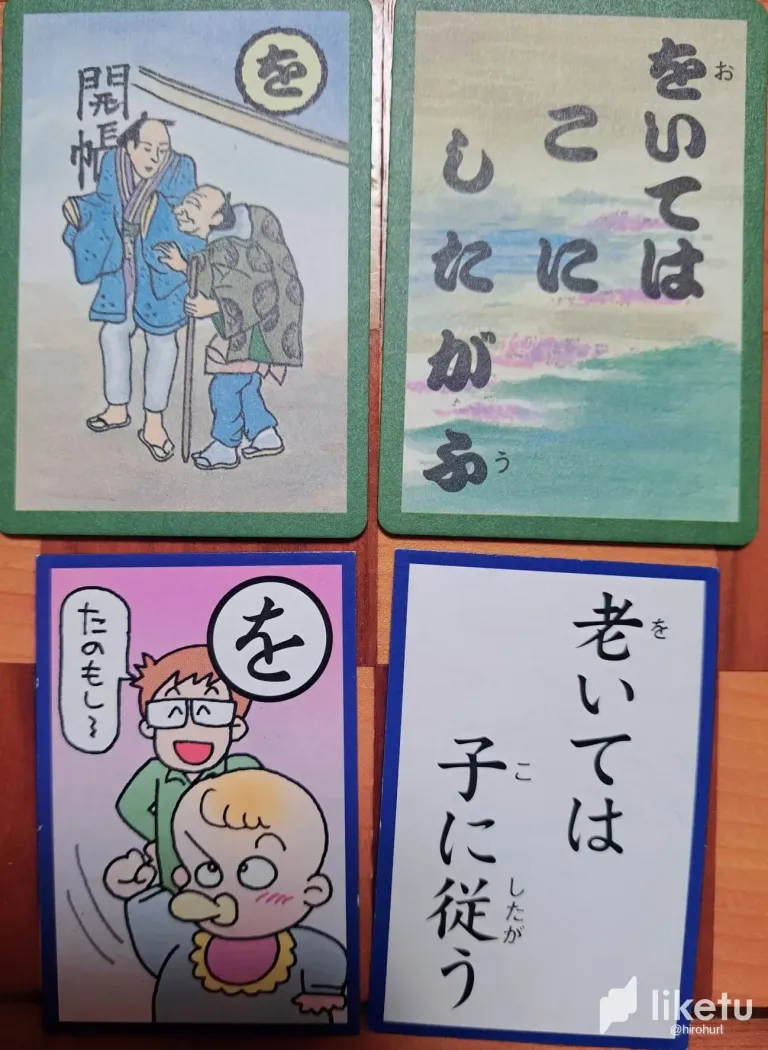
This is the twelfth in the series of Japanese Iroha Karuta playing card deck. Both of my karuta decks use the same proverb to illustrate the twelfth syllable in the "Iroha" hiragana syllabry.
However, the twelfth syllable poses Iroha Karuta deck designers with a bit of a problem. That is because the twelfth character of the hiragana syllabry is "WO" - を - pronounced "Oh". This "を" is not a standard syllable, but a grammatical marker which points to the object of a sentence, and no Japanese sentence begins with the object marker as far as I am aware.
The Problem With "を"
The problem is that the syllable that is designated to each karuta card is used as the initial syllable of the proverb which the card illustrates. So now we come to "Wo" (を), which only occurs before the object of a sentence and never at the beginning of a sentence. So what did the Iroha Karuta deck designers do? They went with with SOUND of the syllable ("OH") and used a proverb that begins with that sound! Sneaky, or what?
Okay, that led to a second design decision; whether to stick with the twelfth character of the syllabry on the reading card, or to replace it with the substitute character either in Kanji (Chinese character) or Hiragana (Japanese syllabary) format.
If you look at the first character on the two reading cards in the photo you will see that they are different. The more elegant deck sticks with the traditional twelfth character, "を", even though the MEANING is quite different. On the other hand my dime-store deck gives us the Chinese character (kanji) - "老" - that shows the actual meaning of the word. The "を" has been placed in smaller script beside it since that is the character that the competitors will be hunting for on the picture card.
What Does It Mean?
Having got that out of the way, what on earth is the twelfth proverb all about?
Let's have a look at it.
老いては子に従う - Oite wa ko ni shitagau
The proverb is made up of five parts:
老いて = "Oite" = getting old
は = "wa" = topic marker, showing what came before to be the topic of the sentence = "with regard to" or "as for"
子 = "ko" = child
に = "ni" = a preposition with various meanings. Here it functions like "to"
従う = "shitagau" = obey, follow.
A literal translation might go like this:
On getting old, obey [be obedient TO] the child.
The feeling is that you should be guided by your children when you get old, or, as the little guidebook that came with my more elegant karuta deck puts it,
老人になったら、子供に任せそれに従った方が良い。"Rōjin ni nattara, kodomo ni makase sore ni shitagatta hou ga yoi."
When you get older, it's better to leave things to your children and follow them.
The reason for this is that times change, and your old ways are no longer the current ways of the world.
If it comes as a bit of a surprise that a culture that traditionally honours the aged (and still has a national holiday in honour of "Respect for the Elderly") should have a proverb that recommends that the old follow the young, it should be borne in mind that Japanese culture is also highly sensitive to the transience of life, which finds its apotheosis in the brief beauty of the cherry blossom. Thus, the idea that "the old should follow the young" also carries with it the idea that we should remain flexible and adapt ourselves to changing times. No disrespect to the elderly is necessarily implied in recommending that they adapt to the ways of the young.
The Differing Nuances Of The Picture Cards
Both the picture cards have some added commentary, and that as well as the illustration itself adds a different nuance to the proverb.
First, the more "elegant" (green") picture card shows a bent old man placing a hand on the younger man as if seeking guidance or support. Behind the younger man are two Chinese characters ("kanji"):
開帳 = "kaichou" = "Opening a shrine cabinet to reveal a hidden Buddha statue." Yeah, quite a few temples in Japan have "hidden Buddhas" that are only revealed to the public once every few years.
However, there is a second meaning to this honourable term, which is gamblers slang that means something like,
"laying one's cards on the table"
In other words, the old geezer has laid his cards on the table in seeking the advice of the young cove. It adds a shade of foreboding to the proverb...
On the other hand, my ever-cheerful dime-store deck has some fun with the idea of the elder following the younger by depicting a baby boss in the foreground and a cheerful father (I assume) saying,
"たのましい~" - "Tanomashii~" - "reliable"
In other words, the man is saying that he can depend on the child.
And with that, I see that my bottle is now empty, and the evening, that was but young when I started this blog post, has now waxed old and waits upon the imminent arrival of a brave new day.
And so I leave you.
David Hurley
#InspiredFocus
For the best experience view this post on Liketu

